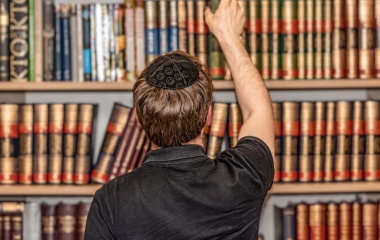
Shehechiyanu vekemanu vhegeyanu lazman hazeh. It was when daf yomi last reached Brachot 27 that I wrote my first “Daily Daf”. For the past seven and a half years it has been a tremendous privilege to share my thoughts on the daf. I want to thank so many of you for your comments, questions, critique and giving me the inspiration continue writing.
At the bottom of this years thought there is a link to our devar Torah from seven and a half years ago. Time does fly!
I invite you to dedicate an upcoming devar Torah. This is a beautiful way to celebrate a simcha, observe a yahrzeit or to show your support for no special reason at all. Please click here to donate. Thank you.
Jay
Brachot 21: Before and After
“One should say one hundred brachot, blessings, a day” (Meanchot 43b). Masechet Brachot, the opening one of the Talmud, details these many brachot[1]. Brachot we say as we daven three times a day, birchat hashachar, birchat kriat shema, the amidah. Brachot over food – both before we eat and afterwards - brachot of kiddush and havdalah. Brachot on natural phenomenon, thunder, lightning, seeing the oceans, comets, even earthquakes. Brachot upon seeing places of great historical importance, on kings and scientists, on building a new home, inheriting money, and sadly on the passing of a relative. Brachot on seeing multitudes of people, for travel and for new clothes. Brachot for the mere fact that we are here to live another day.
Brachot are central to the life of a Jew. All day long we have so many opportunities to proclaim our gratitude and appreciation for the many blessings that we have. What an appropriate topic with which to open the Talmud.
Yet fascinatingly the entire concept of making brachot is rabbinic in nature. The one and only bracha explicitly stated in the Torah is that of birchat hamazon, thanking G-d after we eat a meal.
This too might explain why we begin the study of the Oral Law with masechet Brachot. The Torah is G-d’s word and in the ancient world was accepted by all as such. Yet since well before Talmudic times many did not accept the rabbinic understanding of the Bible. They rejected textual understanding of the Rabbis that often sounded far removed from what the text is saying. Perhaps Rabbi Yehuda Hanassi purposely started with rabbinic laws. asserting that there can be no such thing as Jewish law absent rabbinic interpretation and enactment.
While birchat hamazon is the only bracha explicitly mentioned in the Torah the Gemara posits that there is a second bracha which is of Biblical origin. “Rav Yehuda said: Where do we find that the grace after meals is ordained in the Torah after [we eat]? Because it says: ‘And you shalt eat and be satisfied and bless’. Where do we find that a blessing before studying the Torah is ordained in the Torah? Because it says: When I proclaim the name of the Lord, ascribe ye greatness to our God” (Brachot 21a)[2].
It is noteworthy that Rabbi Yehuda focuses on a bracha after one eats and before one learns. The Talmud tries, unsuccessfully, to compare these two mitzvoth and Biblically require a blessing before one eats and after one learns. In rejecting this comparison – and the ability to apply the law in one case to the law in the other – the Talmud explains that “food provides bodily pleasure” and that “Torah is eternal life”.
Food is the basis of our physical existence and Torah is the basis for our spiritual existence. Both are necessary and dependent on each other – “if there is no flour there is no Torah; if there is no Torah there is no flour” (Pirkei Avot 4:17). Hence it is these two complementary, but opposite, pillars of life that require one to make a bracha. As opposites, the brachot are said at different times, one before and one after.
When it comes to physical enjoyment it is crucial we recite a blessing after we eat. Displaying gratitude before one gets what one wants means little. After we have enjoyed and gotten what we wanted we tend to forget about thanking others – “and Jeshurn waxed fat and kicked” – hence we must bless specifically when we have finished our meal. But when it comes to Torah we must ensure that we approach its study with the proper mindset, as an attempt to study the word of G-d. Torah must be approached with “reverence, fear, quaking, and trembling[3]” (Brachot 22a). The time to do this is before we learn.
Our Sages did ordain that when it comes to food we are obligated to make a bracha before we eat. So much so that our Sages claim that one who eats without first making a bracha is little but a thief taking without permission from G-d “to whom is the earth and all therein”. Only after making a bracha can we apply the verse “and the earth He gave to man”.
Yet interestingly there is no rabbinically ordained bracha when we finish learning. Perhaps that is because there is no such thing as an end to Torah study. Even when we put away our books and carry on with our day-to-day activities we are still “studying” Torah, moving from the realm of theoretical Torah to practical Torah. It is along these lines that the Tosafists (Brachot 11b s.v. shekevar) explain why one who say eats an orange in the morning and then eats another orange in the afternoon must make a second boreh pri haeitz. The two eatings are disconnected one from each other. No matter how much one ate yesterday one will get hungry tomorrow.
Learning is different. One who attends a shiur in the morning and then attends another in the afternoon would not make a second birchat Hatorah. What one learns in the afternoon connects with and continues what one has learned in the morning. One may formally learn a little in the morning and a little in the evening, in between being an opportunity to put Torah into practice. Torah learning must in practice inform how we conduct our business affairs, how we communicate with our colleagues, clients and competitors, how we drive, how we shop and all else. Torah study is meaningful and so very important only because “study leads to practice”. And it is specifically when we are not formally studying Torah that we can put Torah into practice. Having Torah as our guide throughout the day is the greatest of blessings.
[1] Interestingly, masechet Brachot opens with the mitzva of kriat shema, our declaration of the acceptance of the kingship of G-d. While it is a most appropriate opening for the Talmud as a whole, being that it is not actually a bracha, it would seem to be less appropriate as an opening to masechet Brachot. However, when we realize that the greatest blessing we can have is feeling the presence of G-d “when we sit in our homes, when we travel on the way, when we go to sleep and when we awaken” then despite lacking the formal trappings of a bracha, there is no greater bracha than that of kriat shema.
[2] As Rashi explains, Moshe told the Jewish people that when he calls out G-d’s name, ki shem Hashem Ekra, you should answer amen, havu godel leokeinu. The Ramban includes the saying of birchat Hatorah in his enumeration of the 613 mitzvoth.
[3] It is noteworthy that this discussion regarding Biblical brachot is placed in the midst of the Talmudic discussion as to whether one who had a seminal emission – the opposite of “reverence, fear, quaking, and trembling” – may learn Torah without having gone to mikvah.



